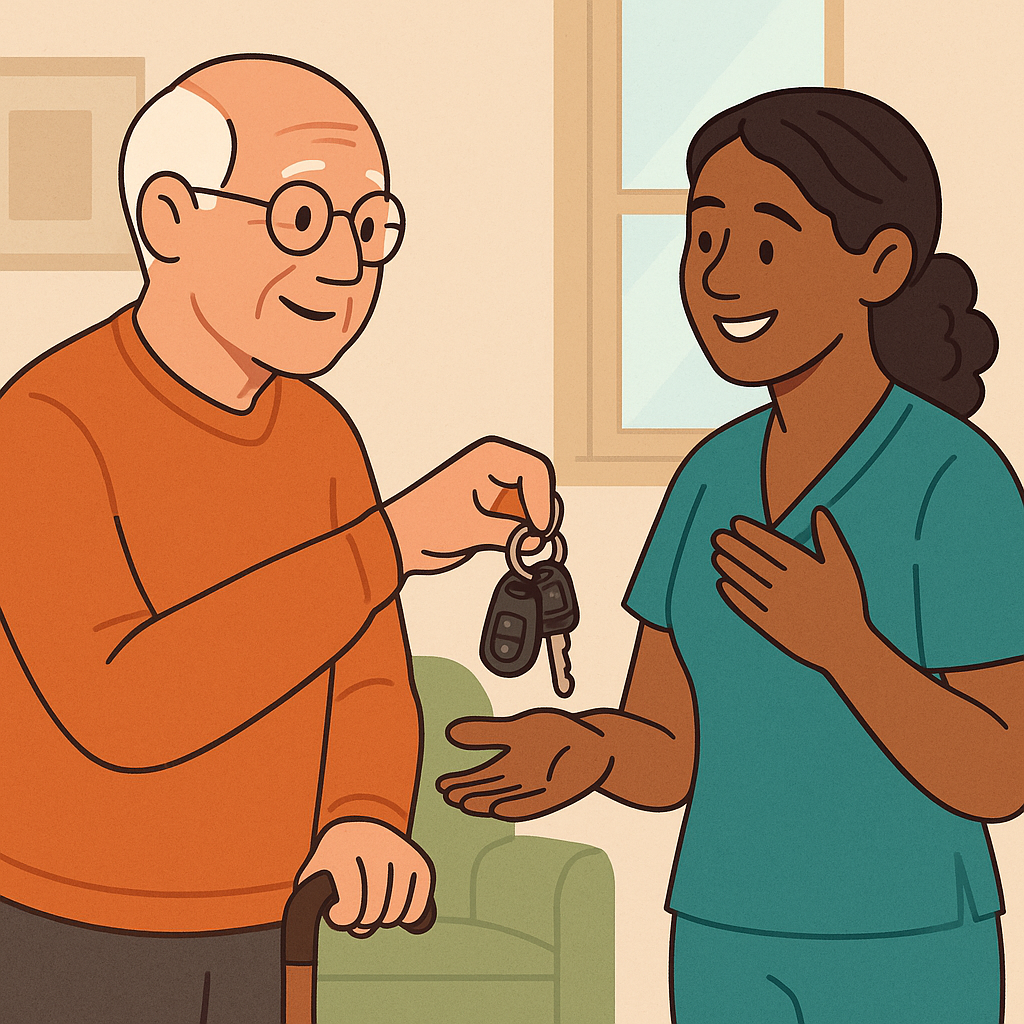How to Have "The Talk": When It's Time for Seniors to Stop Driving
In a city like Atlanta, where I-85 can feel like a racetrack and merging is a contact sport, driving safely takes sharp reflexes and full attention. For older adults, though, changes in vision, reaction time, and confidence behind the wheel can make driving increasingly risky. But telling Mom or Dad it might be time to hang up the keys... that's one of the hardest conversations a family can have!
At 4 Seasons Home Care, we've seen firsthand how this transition impacts families. It's not just about transportation, it's about independence, safety, and dignity. Let's talk about how to recognize the signs, have that tough conversation, and find companion home care solutions that work for everyone.
Table of Contents
- Why Driving Changes with Age
- Signs It May Be Time to Stop Driving
- The Atlanta Factor: Why Driving Here Is Different
- How to Have "The Talk" About Driving
- Safer Alternatives to Driving
- How 4 Seasons Home Care Can Help
- FAQs
Why Driving Changes with Age
For many seniors, the car keys represent freedom. But as we age, physical and cognitive changes can subtly affect driving ability. Reaction time may slow, peripheral vision narrows, and medications can cause drowsiness or dizziness. These challenges don't mean someone has to stop driving immediately...but they do mean it's time to start paying attention.
| Common Change | Impact on Driving |
|---|---|
| Reduced Vision | Difficulty reading signs, seeing pedestrians, or driving at night. |
| Slower Reflexes | Less time to react to sudden traffic stops or lane changes. |
| Hearing Loss | May miss sirens, horns, or other warning sounds. |
| Medication Side Effects | Drowsiness, blurred vision, or confusion can impair focus. |
| Arthritis or Limited Mobility | Harder to turn the wheel, look over shoulders, or press pedals. |
According to the National Highway Traffic Safety Administration, people aged 65 and older make up nearly 20% of all licensed drivers, but account for a disproportionate number of fatal crashes. That's not because older adults are reckless...it's because the human body simply becomes more fragile over time. Even minor fender-benders can lead to serious injury.
Signs It May Be Time to Stop Driving
Sometimes, the signs are obvious. Other times, they're subtle and easy to dismiss. If you've noticed any of the following behaviors, it might be time to reassess driving habits:
- Getting lost on familiar routes
- New dents or scratches on the car
- Difficulty judging distance or reacting to traffic
- Increased anxiety or hesitation while driving
- Confusing the gas and brake pedals
- Close calls, near misses, or traffic tickets
- Friends or family refusing to ride along
Even one or two of these can signal that your loved one isn't as safe behind the wheel as they used to be. And in a fast-moving city like Atlanta, where lanes shift quickly and drivers rarely slow down, small mistakes can lead to major consequences.
The Atlanta Factor: Why Driving Here Is Different
If you've driven anywhere near Peachtree Street, the Connector, or I-285 during rush hour, you know that Atlanta driving isn't for the faint of heart. Aggressive merging, unpredictable weather, and long commutes all add pressure. For seniors—especially those who only drive occasionally—the pace and intensity of Atlanta traffic can feel overwhelming.
In metro areas like Buckhead, Marietta, and Dunwoody, seniors also face challenges like complex intersections, crowded parking lots, and constant construction. Add in low visibility during summer storms or early sunsets in winter, and you've got a recipe for stress and potential danger.

How to Have "The Talk" About Driving
Telling a parent it's time to stop driving is emotional for everyone. Here's how to approach the conversation with compassion and respect:
1. Choose the Right Time and Place
Don't spring the conversation on them mid-errand or after a stressful drive. Sit down somewhere quiet and familiar. Bring love, not lectures.
2. Lead with Empathy
Start by acknowledging what driving means to them. Try: "Dad, I know how much you value your independence. You've always been such a safe driver, but I've started to worry about your safety in Atlanta traffic."
3. Focus on Safety, Not Control
This isn't about taking away freedom—it's about keeping your loved one (and others) safe. Use phrases like "I want you to stay safe and comfortable" instead of "You can't drive anymore."
4. Bring in Backup
Sometimes, hearing it from a neutral voice helps. Ask a doctor, occupational therapist, or care coordinator to evaluate driving ability. Professionals can provide objective input—and sometimes, that carries more weight.
5. Offer Alternatives
Present options before problems. Talk about rideshare apps, family driving rotations, or hiring a professional caregiver for errands. Showing that life won't stop without the car makes the transition easier.
Safer Alternatives to Driving
There's no shortage of transportation options today, and many can help seniors maintain freedom without getting behind the wheel:
| Option | Best For | Notes |
|---|---|---|
| Rideshare (Uber/Lyft) | Quick errands and appointments | Caregivers can schedule and track rides for safety. |
| Family/Friend Rotation | Close-knit families | Build a shared calendar for rides to reduce stress. |
| Senior Shuttle Services | Non-drivers needing consistency | Some Atlanta community centers and churches offer transport. |
| 4 Seasons Caregiver Transportation | Home care clients | Our caregivers safely drive clients to appointments, social outings, and errands. |
How 4 Seasons Home Care Can Help
At 4 Seasons Home Care, we understand that giving up driving can feel like giving up control. That's why our caregivers go beyond transportation: we're companions, advocates, and safety partners. Whether it's getting Mom to a doctor's appointment, picking up groceries, or simply offering a friendly face in the passenger seat, our caregivers are here to help make life easier and safer.
We also offer flexible support for families navigating this stage of life. From respite care for adult children to 24/7 companionship, our team helps ease the emotional and practical load that comes with these transitions.
FAQs
What age do most seniors stop driving?
There's no magic number, but most people start scaling back driving between 75 and 85. What matters more than age are the signs—confusion, slowed reflexes, or vision changes.
Should I take away my parent's keys?
Not right away. Start with smaller steps like limiting night driving or long-distance trips. If safety remains a concern, talk to their doctor or a driving evaluator for a professional opinion.
How do I convince a parent to stop driving?
Be gentle and patient. Focus on shared goals like safety and independence rather than control. Offer solutions—like caregivers or rideshare support—so it doesn't feel like a loss.
Can caregivers drive seniors in Atlanta?
Yes! 4 Seasons Home Care caregivers are trained, insured, and background-checked to provide safe local transportation for errands, appointments, or social visits.
Having "The Talk" about driving isn't easy, but it's one of the most loving things you can do. With patience, empathy, and the right support, you can help your loved one stay safe without feeling isolated or ashamed.
4 Seasons Home Care is Atlanta's trusted choice for compassionate, reliable senior support.
